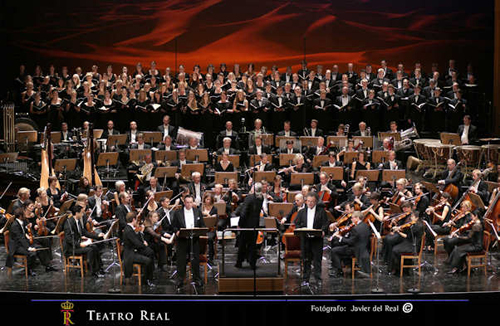 Spain Arnold Schönberg: Moses und Aron: SWR Symphony Orchestra Baden-Baden-Freiburg, EuropaChor Akademie, Sylvain Cambreling (conductor), Madrid Teatro Real. 7.9.2012 (JMI)
Spain Arnold Schönberg: Moses und Aron: SWR Symphony Orchestra Baden-Baden-Freiburg, EuropaChor Akademie, Sylvain Cambreling (conductor), Madrid Teatro Real. 7.9.2012 (JMI)
Concert Version
Cast:
Moses: Franz Grundheber
Aaron: Andreas Conrad
A young girl: Johanna Winkel
An invalid girl: Elvira Bill
A young man: Jean-Noël Briend
A naked young man: Jason Bridges
A man: Andreas Wolf
A Priest: Friedemann Röhling

Madrid’s Teatro Real opens its new opera season with two performances in concert form of Arnold Schönberg’s only large-scale ‘opera’ which also has its premiere in Madrid. Not so in Spain however, since it was offered at Barcelona’s Liceu in 1985.
Schoenberg had already died (1951), leaving the work unfinished when it was first performed in 1954; in Hamburg and also in concert form. Its first stage performance took place in Zurich in 1957 but subsequently the piece did not enter the main repertoire of the larger opera houses so that performances of any sort have always been rather scarce. We might reasonably ask if Moses und Aron is an opera at all in fact or rather a symphonic-choral composition. Either way it deserves to be better known and I find quite right that Teatro Real has finally produced it. It was to have opened the program for Madrid’s 2009-2010 season but Gerard Mortier cancelled it, when he became the Teatro Real’s artistic director.
Schönberg never composed the third act, although the libretto, which he also wrote was completed.The missing act describes Moses’ ultimate predominant influence over Aaron, who are meant to represent idealism and action respectively. Most of the plot in fact revolves around the inability of the inarticulate Moses to explain to the chosen people the reality of an invisible god, a task that sees him transferring the responsibility for doing so to Aaron, with the resultant problems narrated in Exodus.
As a small but rather curious anecdote, I should mention the fact that Schönberg eliminated the second “a” of Aaron to avoid having the opera’s title contain exactly 13 letters. He was evidently a great musician and a superstitious one simultaneously
This is an opera that requires a huge orchestra and large chorus and its musical interpretation is clearly not easy, considering the musical language employed by the composer. Madrid’s musical direction was entrusted to Sylvain Cambreling, who seems to be very comfortable in the contemporary repertoire. Indeed, his performance was engaging, given the work’s presentational problems. Nearly two hours of twelve-tone music are not easily digested by most opera audiences and yet there were almost no defectors during the concert’s interval. Under Mr Cambreling’s baton we heard a remarkable orchestra and a fine chorus
Vocal interest is rather a secondary consideration in this work, since there are only two major characters, Moses and Aaron, the first of which is essentially a declamatory one while the second has more to sing. Apart from these there are a number of secondary characters who have little or no musical importance although they are necessary to the narrative
In the character of Moses we had Franz Grundheber, who is probably the singer with the most active association with this role. His performance was excellent. Tenor Andreas Conrad is also used to the role of Aaron and he offered a good performance, though his voice does not have over-excessive brightness or volume. In the supporting roles good impressions were left by Friedemann Röhling, as the Priest, and by Elvira Bill, as the invalid girl.
The Teatro Real was not sold out, with more empty seats than might be expected from the tickets left available for sale. It seems that quite a few people must havedecided to stay home with ticket in their purses or pockets.
José Mª. Irurzun